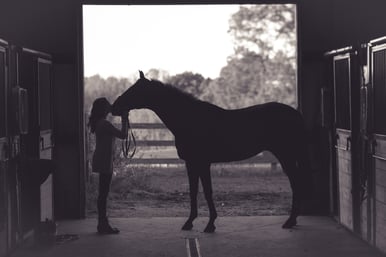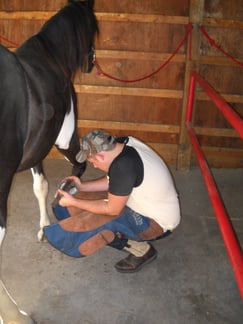If you love working with horses then perhaps it’s time for you to consider turning your passion into a sustainable and rewarding career in the equine industry.
Currently, almost half a million people work with horses in some capacity across the United States. The equine industry offers a variety of career options such as being an office secretary at a horse show, doing genetic research in a lab, horse packing in the mountains, or teaching children how to ride at a local horse camp.
Careers in the equine industry can be tailored to make the most out of anyone’s talents, interests, and skills. As a result, horse lovers have found a way to turn a fulfilling lifestyle into a financially secure career.

What Are Employers in this Industry Looking For?
Employers within the equine industry look for five things when hiring an employee. Those five things are listed below.
- Credentials. If the job you are going to perform needs a certificate or a degree, an employer will want to see proof that you've completed those requirements. Farriers often receive certificates from horseshoeing schools, while barns often look for riding instructors to have a Certified Horsemanship Association (CHA) membership. On the other hand, therapeutic centers want employees to have a Professional Association of Therapeutic Horsemanship (PATH) or Equine Assisted Growth and Learning Association (EGALA) certification. Many employers also require either an associate or bachelor’s degree, and some even require a master’s.
- Experience & technical skills. Tied with credentials, employers will also look at your resume to see your equine-related skills. These skills can range from working on a ranch or riding camp over the summer, to apprenticing for a farrier. Experience can come from previous work, internships, and/or volunteering opportunities. Working in an area that is closely related to your career goal looks best on a resume; however, working just in general (even if it isn’t equine-related) is better than not working at all. It also helps you with networking and getting valuable references for future positions.
- Work ethic. The equine industry can be laborious. Horses do not stop needing care just because it’s after 5 PM, and in some cases they need around-the-clock care. A future employer will want you to be dependable, which includes showing up to work on time and working overtime if needed. You will also need to get tasks done right and within a short amount of time.
- Communication skills. Employers in the industry also want you to properly explain your thoughts verbally or in a written format. They also want you to work independently or within a team, as well as having flexibility. They want you to do your job, speak up when necessary, and not create discord among co-workers or customers.
- Ability to be coachable. Everyone can learn and grow. The equine industry is constantly changing and people are continuously learning new things to improve their skills. Whether it's training, health care, daily care, nutrition, or management, employers seek out those who are able to accept constructive criticism and learn from it. Someone who refuses to accept feedback in order to grow and learn is not someone they'll want to hire.

Where Can I Get the Training I Need to Enter the Equine Industry?
Hocking College in Nelsonville, OH has both an Equine Health & Complimentary Therapies program, as well as a Farrier Science & Business program.
For more information on Hocking College’s Equine Programs, contact Equine Science Program Manager, Bethany Siehr, by email at siehrb@hocking.edu or by phone at (740) 753-6282.


